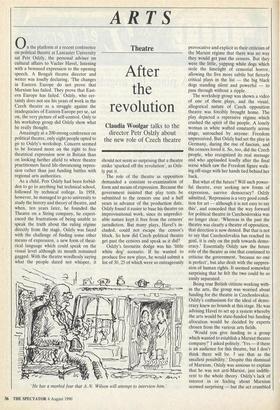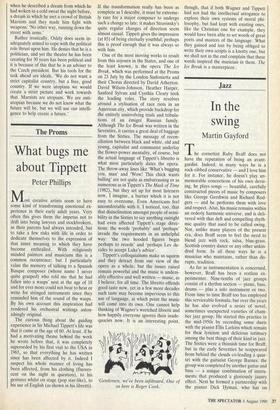ARTS
Theatre
After the revolution
Claudia Woolgar talks to the director Petr Oslzly about the new role of Czech theatre 0 n the platform at a recent conference on political theatre at Lancaster University sat Petr Oslzly, the personal adviser on cultural affairs to Vaclav Havel, listening with a bemused expression to the opening speech. A Bengali theatre director and writer was loudly declaring, 'The changes in Eastern Europe do not prove that Marxism has failed. They prove that East- ern Europe has failed.' Oslzly, who cer- tainly does not see his years of work in the Czech theatre as a struggle against the inadequacies of Eastern Europe per se, sat on, the very picture of self-control. Only to his workshop group did Oslzly show what he really thought.
Amazingly at a 200-strong conference on political theatre, only eight people opted to go to Oslzly's workshop. Concern seemed to be focused more on the right to free theatrical expression now in Britain than on looking further afield to where theatre practitioners faced life-threatening repres- sion rather than just funding battles with regional arts authorities.
As a child, Petr Oslzly had been forbid- den to go to anything but technical school, followed by technical college. In 1958, however, he managed to go to university to study the history and theory of theatre, and when, ten years later, he founded the Theatre on a String company, he experi- enced the frustrations of being unable to speak the truth about the ruling regime directly from the stage. Oslzly was faced with the challenge of finding some other means of expression, a new form of theat- rical language which could speak on the visual level although its mouth remained gagged. With the theatre wordlessly saying what the people dared not whisper, it
should not seem so surprising that a theatre strike 'sparked off the revolution', as Oslz- ly put it.
The role of the theatre as opposition demanded a constant re-examination of form and means of expression. Because the government insisted that play texts be submitted to the censors one and a half years in advance of the production date, Oslzly found it easier to base his theatre on improvisational work, since its unpredict- able nature kept it free from the censors' jurisdiction. But many plays, Havel's in- cluded, could not escape the censor's block. So how did Czech political theatre get past the censors and speak as it did?
Oslzly's favourite dodge was his 'little white dog' scenario. If he wanted to produce five new plays, he would submit a list of 30, 25 of which were so outrageously
'He has a morbid fear that A. N. Wilson will attempt to interview him.'
provocative and explicit in their criticism of the Marxist regime that there was no way they would get past the censors. But they were the little, yapping white dogs which stole the limelight of censorial horror, allowing the five more subtle but fiercely critical plays in the list — the big black dogs standing silent and powerful — to pass through without a ripple.
The workshop group was shown a video of one of these plays, and the visual, allegorical nature of Czech opposition theatre was forcibly brought home. The play depicted a repressive regime which crushed the spirit of the people. A lonely woman in white wafted constantly across stage, untouched by anyone: Freedom unperceived. But Oslzly had set the play in Germany, during the rise of fascism, and the censors loved it. So, too, did the Czech people, who recognized its real message and who applauded loudly after the final scene which saw the Freedom figure walk- ing off-stage with her hands tied behind her back.
But what of the future? Will such power- ful theatre, ever seeking new forms of expression, survive democracy? Oslzly admitted, `Repression is a very good condi- tion for art — although it is not easy to say this', and conceded that the way forward for political theatre in Czechoslovakia was no longer clear. 'Whereas in the past the theatre was clearly a theatre of opposition, that direction is now denied. But that is not to say that Czechoslovakia has reached its goal, it is only on the path towards demo- cracy.' Essentially Oslzly saw the future role of the theatre as one that continued to criticise the government, 'because no one is perfect', but also dealt with the suppres- sion of human rights. It seemed somewhat surprising that he felt the two could be so easily separated.
Being true British citizens working with- in the arts, the group was worried about funding for the theatre in Czechoslovakia. Oslzly's enthusiasm for the ideal of demo- cracy knew no bounds at this stage. He was advising Havel to set up a system whereby the arts would be state-funded but funding allocation would be decided by experts chosen from the various arts fields.
`Would you give funding to a group which wanted to establish a Marxist theatre company?' I asked politely. `Yes — if there is an audience for this theatre, but I don't think there will be. I see that as the smallest possibility.' Despite this dismissal of Marxism, Oslzly was anxious to explain that he was not anti-Marxist, just indiffe- rent to the whole theory. Oslzly's lack of interest in or feeling about Marxism seemed surprising — but the act crumbled when he described a dream from which he had woken in a cold sweat the night before, a dream in which he met a crowd of British Marxists and they made him fight with weapons: `No other way, running down the street with arms.'
Rather ironically, Oslzly does seem in- adequately armed to cope with the political role thrust upon him. He denies that he is a politician, and yet the theatre he has been creating for 30 years has been political and it is because of this that he is an adviser to the Czech president. But his tools for the task ahead are ideals. 'We do not want a strict capitalist country, but a free, good country. If we were utopians we would create a strict picture and work towards that. Marxists are utopians. We are anti- utopian because we do not know what the future will be, but we will use our intelli- gence to help create a future.'

















































 Previous page
Previous page